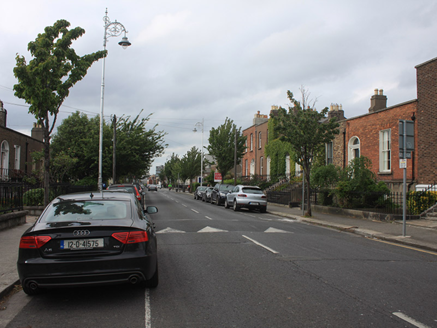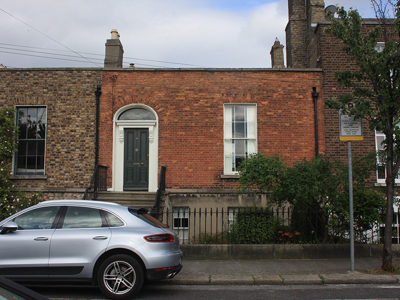Survey Data
Reg No
50110344
Rating
Regional
Categories of Special Interest
Architectural, Artistic
Original Use
House
In Use As
House
Date
1845 - 1865
Coordinates
315406, 232959
Date Recorded
16/06/2017
Date Updated
--/--/--
Description
Terraced two-bay single-storey house over raised basement, built c. 1855. M-profile pitched slate roof with brick and rendered chimneystacks having clay pots, partially hidden behind parapet with cut granite coping. Cast-iron rainwater goods. Red brick, laid in Flemish bond, to front (west) elevation, having cut granite plinth course over rendered basement wall. Square-headed window openings with granite sills and rendered reveals, having six-over-six pane and four-over-four pane timber sliding sash windows. Some timber panelled shutters visible to interior. Elliptical-headed door opening to front elevation having moulded render surround. Doorcase comprising panelled pilasters with scrolled consoles having acanthus leaf detail, supporting carved cornice. Plain fanlight with house number in gold leaf, timber panelled door having brass details. Nosed granite steps with recent railings, cast-iron coal-hole cover. Square-headed door opening having recent door to basement. Cast-iron gate and matching railings on granite plinth wall enclosing basement area.
Appraisal
Forming part of a terrace of three, the scale and form of these small genteel townhouse is characteristic of this part of Dublin. Well-proportioned, it retaining historic features including a well-executed doorcase and timber sliding sash windows. Its fine railings are testament to the quality of Victorian mass-produced ironwork, and add to both the setting of the house and the character to the streetscape. Heytesbury Street forms part of an early Victorian neighbourhood located to the west of Camden Street. Named after Baron Heytesbury, Viceroy 1844-6, the street was first laid out in 1846 and was nearing completion by 1861.





